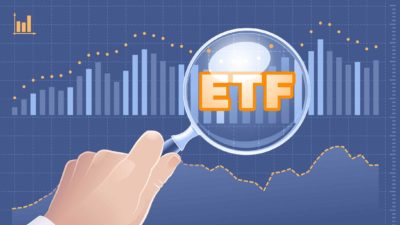Over the past 20 years, the popularity of exchange-traded funds (ETFs) has exploded. There are now more than 200 ASX ETFs available to invest in on the Aussie bourse.
These include a broad range of Australian and international index funds as well as those seeking to track a particular sector, commodity or theme.
One of the best things about ASX ETFs is their ability to add instant diversification to an investment portfolio. Even by owning a mere one or two such funds, an investor has the potential to gain investment exposure to a variety of sectors, company sizes and international markets.
But with so many now available, choosing where to invest can be challenging. So, we asked our Foolish writers which ASX ETFs they think offer top buying right now. Here is what the team came up with:
7 best ASX ETFs for February 2023 (smallest to largest)
VanEck Global Clean Energy ETF (ASX: CLNE), $126.62 million
Betashares Global Quality Leaders ETF (ASX: QLTY), $353.86 million
VanEck Morningstar Wide Moat ETF (ASX: MOAT), $494.11 million
Betashares Global Cybersecurity ETF (ASX: HACK), $640.44 million
Betashares Nasdaq 100 ETF (ASX: NDQ), $2.54 billion
BetaShares Australia 200 ETF (ASX: A200), $2.74 billion
VanEck MSCI International Quality ETF (ASX: QUAL), $3.07 billion
(Market capitalisations as at market close on 10 February 2023)
Why our Foolish writers love these ASX exchange-traded funds
VanEck Global Clean Energy ETF
What it does: The VanEck Global Clean Energy ETF aims to invest in the 30 largest and most liquid global companies working in clean energy production, as well as associated technology and equipment.
By Brooke Cooper: Part of being a long-term investor is looking to the horizon in an effort to envisage what the world might look like in 10, 20, or 50 years' time. And one megatrend I think will be here to stay is the energy transition.
I expect demand for renewable energy sources – and investment in the space – will continue increasing as the world moves to decarbonise.
But how might one make the most of such an opportunity? There's an ASX ETF for this!
I think the VanEck Global Clean Energy ETF could be an easy way to get exposure to the decarbonisation megatrend.
Motley Fool contributor Brooke Cooper does not own units of the VanEck Global Clean Energy ETF.
Betashares Global Quality Leaders ETF
What it does: This ETF invests in a portfolio of 150 global companies that rank highly on quality metrics. Those four metrics include return on equity (ROE), debt-to-capital, cash flow generation ability and earnings stability.
By Tristan Harrison: Global shares suffered in 2022 as higher interest rates enabled investors to generate semi-decent returns from traditionally safer asset classes like cash and bonds.
Since the end of 2021, the Betashares Global Quality Leaders ETF has dropped by close to 20%. I don't believe the businesses this ASX ETF holds have seen a 20% reduction in their quality. But, they are now a fifth cheaper than before.
Also, in a potential downturn, I think the high-quality shares within this ETF are more likely than the average business to perform well.
For an annual management fee of just 0.35%, I like the diversification and quality overlay this ETF has to offer.
Motley Fool contributor Tristan Harrison does not own units of the Betashares Global Quality Leaders ETF.
VanEck Morningstar Wide Moat ETF
What it does: This ETF invests in a portfolio of US shares identified as having an intrinsic competitive advantage.
By Sebastian Bowen: This actively-managed ETF is one of my oldest and most valued investments. It invests in a basket of US shares that have been identified as possessing a wide moat, or distinct competitive advantage.
This is a concept popularised by the legendary Warren Buffett and refers to characteristics, such as a strong brand, that help a company ward off competition.
The approach has worked well for this ETF, with the Wide Moat ETF averaging a 14.54% per annum return since 2015.
As such, this is an investment I would happily recommend this February.
Motley Fool contributor Sebastian Bowen owns units of the VanEck Morningstar Wide Moat ETF.
Betashares Global Cybersecurity ETF
What it does: This ASX ETF offers investors exposure to 36 large-cap global cybersecurity stocks, predominantly listed in the United States. Its top holdings are Broadcom, Cisco Systems, Fortinet, Infosys, and Palo Alto Networks.
By Bernd Struben: Among the lessons learned in 2022 is that cybercriminals are here to stay. This was driven home by the massive data breaches experienced by Optus and Medibank. And instances of hacking were far from limited to just those two big players.
Hoping to keep their data secure, 80% of larger Australian companies intend to increase their cybersecurity spending in 2023, according to research by Netskope. That's after 63% of large companies reported ramping up spending in 2022.
With hackers targeting individuals and corporations across the world, global cybersecurity spending will most likely continue to grow in the foreseeable future. And I believe that should help support the Betashares Global Cybersecurity ETF price and its distribution payouts.
At the current price, this ASX ETF pays a trailing annual distribution yield of 8.3%, unfranked.
Motley Fool contributor Bernd Struben does not own units of the Betashares Global Cybersecurity ETF.
Betashares Nasdaq 100 ETF
What it does: This ETF invests in 100 of the largest non-financial businesses on the US NASDAQ exchange. Examples include Microsoft, Apple, Alphabet, Amazon, Tesla, Adobe, Intel, and Meta Platforms.
By Bronwyn Allen: We live in a high-tech age, and that's never going to change. I believe current short-term economic headwinds like rising inflation and interest rates are providing a great buy-the-dip opportunity on tech stocks.
I like the Betashares Nasdaq 100 ETF far more than some other tech-focused ETFs, like the BetaShares S&P/ASX Australian Technology ETF (ASX: ATEC). This is simply because NDQ holds a bunch of world-leading brands, whereas Australia's tech sector is junior by comparison.
Personally, if I'm going to invest in tech, I prefer to put my money into an ETF with Microsoft-sized businesses that are earning great, reliable profits, as opposed to tech start-ups — even if they are promising.
The NDQ ETF share price lost 31% of its value over the 12 months of 2022, but it's already up by around 11% in 2023!
Motley Fool contributor Bronwyn Allen does not own units of the Betashares Nasdaq 100 ETF.
BetaShares Australia 200 ETF
What it does: Providing cheap access to the top 200 Australian companies, this Betashares ETF is a no-frills way of earning the average return of the Australian share market. Closely emulating the S&P/ASX 200 Index (ASX: XJO), the A200 ETF predominantly comprises the big banks and miners.
By Mitchell Lawler: Trends come and go – sometimes they fail to materialise altogether. While I can see the value in sector-based or thematic ETFs, I much prefer to invest in companies, not themes.
Instead, where I see ETFs being highly valuable is for low-cost, passive index investing. It might be considered 'boring', but we know that the ASX 200 has always moved to higher highs over time, whilst also producing a delicious dividend yield.
Even the great Warren Buffett is a major proponent of low-cost index investing.
Notably, the Betashares Australia 200 ETF is the cheapest Australian shares ETF on offer – even beating those offered by Vanguard – with a management fee of 0.07%.
Motley Fool contributor Mitchell Lawler does not own units of the Betashares Australia 200 ETF.
VanEck MSCI International Quality ETF
What it does: This ASX ETF gives investors exposure to a diversified portfolio of approximately 300 quality, international companies listed on exchanges in developed markets around the world (excluding Australia).
By James Mickleboro: I think one of the best ways to grow your wealth is by investing in quality shares over a long period. This ETF provides investors with an easy way to do exactly that by pulling together approximately 300 of the world's highest-quality companies.
To be included in the fund, a company needs to have low leverage, high earnings growth rates, and high returns on equity (ROE).
A few examples of companies that tick these boxes and are included in this ASX ETF are Apple, ASML, Microsoft, Nike, Nvidia, and Visa.
The VanEck MSCI International Quality ETF has fallen by almost 7% over the past year so could offer a buying opportunity in February.
Motley Fool contributor James Mickleboro does not own units of the VanEck MSCI International Quality ETF.








